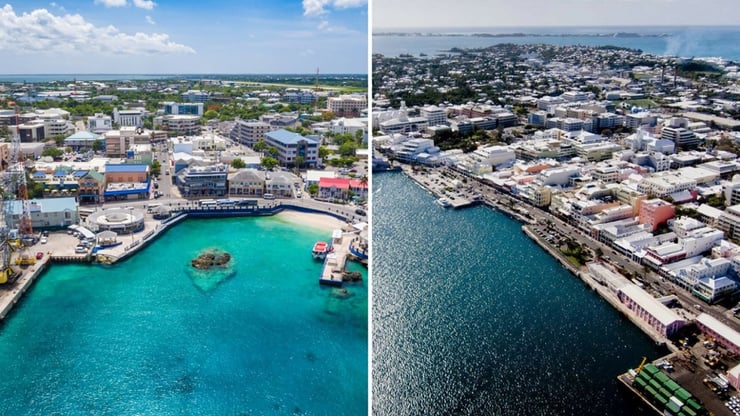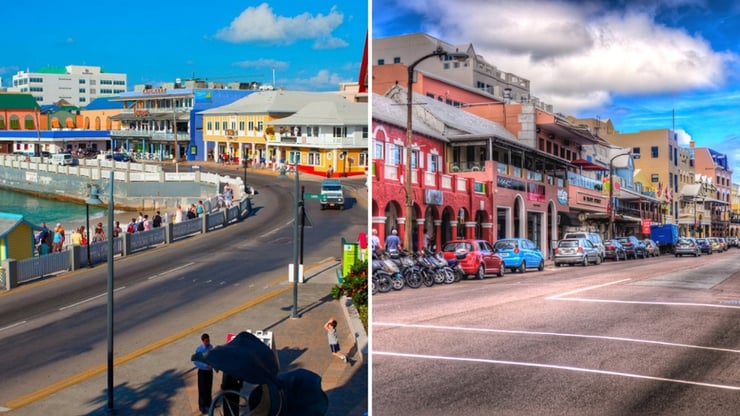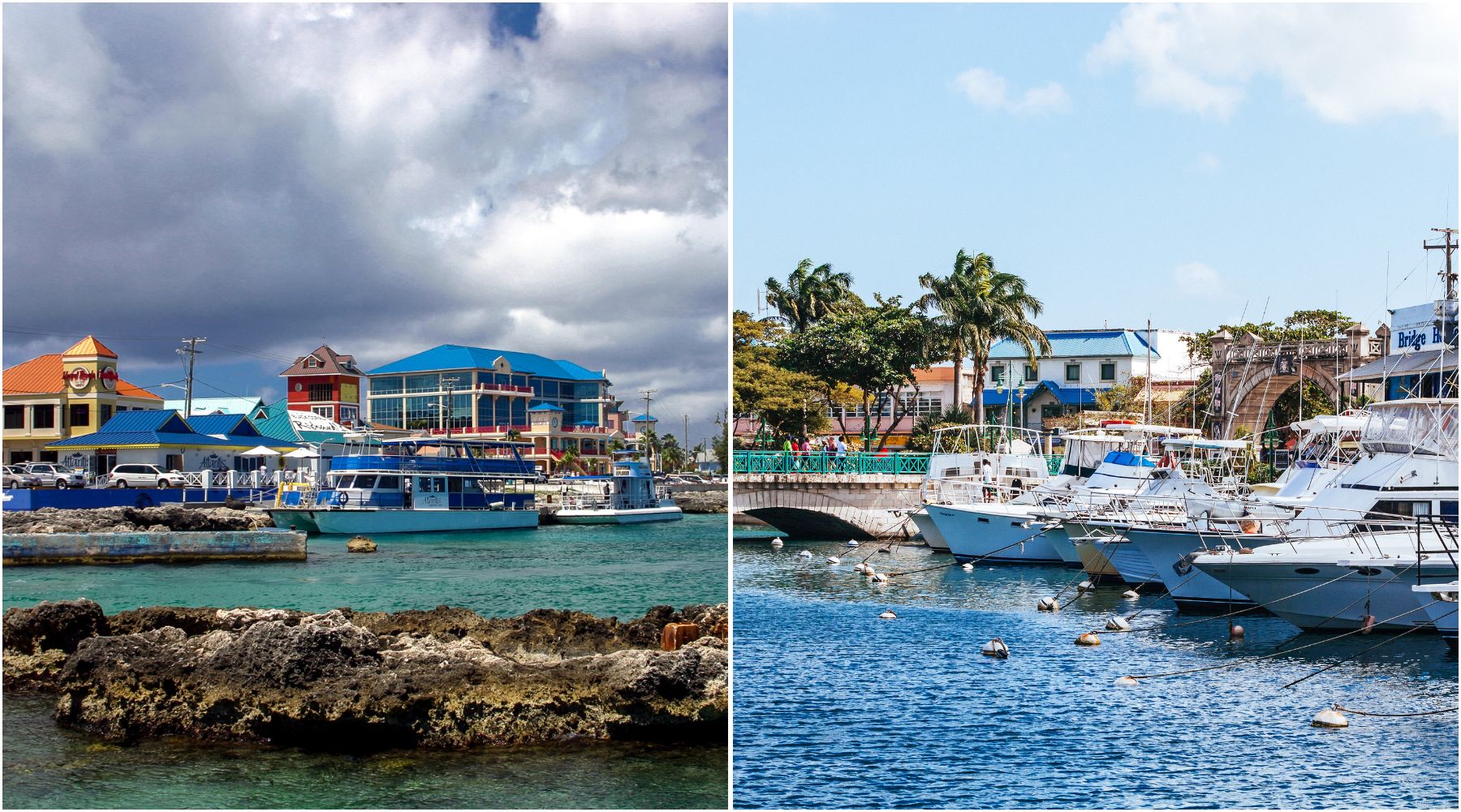
Pictured above: Aerial view of George Town, Grand Cayman (Right) and Hamilton, Bermuda (Left) by Mike Davis
Why is Cayman the ideal jurisdiction for crypto and virtual asset companies?
- Truly Tax Free
- Cost of Living
- An Endless Summer
- Relaxed Vibes
Crypto, blockchain and other virtual asset companies are relocating to the Caribbean at an ever-accelerating rate. There are many reasons – both push and pull factors – that give reason for this. The push reasons include unclear regulations and a broad theme of crackdown on crypto communities from onshore markets such as USA and UK. The pull markets are quite the opposite, with jurisdictions such as the Cayman Islands offering dedicated special economic zones for virtual asset companies, a lack of any red-tape or stifling regulations, and of course the favorable lifestyle and reduced or tax-free climate offered on some islands. Cayman is an autonomous British Overseas Territory, which means that it falls under British jurisdiction and sovereignty, but is not a part of the United Kingdom. Cayman’s head of state is the British monarch, but it is locally self-governed by a democratically-elected government. Cayman is a very stable country both politically and economically, and is exceptionally friendly to business and investment vehicles, including the famous lack of direct-taxation
Cayman hosts a dedicated special economic zone, Cayman Tech City, that’s enabling the cryptocurrency, blockchain and Web3 community to scale globally, giving companies and entrepreneurs an easy, fast, and cost-effective method to set up their company offshore. Indeed, Cayman has already welcomed hundreds of virtual asset companies to its shores, including Chainlink, Avalanche, Ledn, Aave, and MakerDAO.
New associations and societies have been established, including Digital Cayman and the Cayman Islands Virtual Assets Society (CIVAS), set-up by Cayman Enterprise City, and the Blockchain Association of the Cayman Islands (BACI). These associations act with the aim of facilitating collaboration in the tech industry (in the case of Digital Cayman) and the blockchain industry (in the case of CIVAS and BACI), creating guidelines for the tech industry, and lobbying the Cayman Islands government and the regulators to encourage the development of the tech industry. They also create a local network and ecosystem, bringing together local companies and special economic zone members with a shared interest in the complex and subtle relationships between virtual assets, knowledge, and Cayman. Workforce development efforts by non for profit organization Enterprise Cayman are also further driving the development of a local talent pool and the overall success of the sector. Events such as the CEC Tech Talks and Fin Talks helps to foster this innovative ecosystem.
Why should you choose the Cayman Islands incorporate your crypto and virtual asset company offshore, over alternatives such as Bermuda?
Other Caribbean islands have been making moves in this same space, with Bermuda making news recently with Coinbase announcing they were fleeing USA in light of legal threats received from regulators. On the surface, the two islands may appear to be relatively comparable, but Cayman offers substantial advantages when you look beneath the surface.
Truly Tax-Free
One of the biggest distinctions between the two islands, beyond weather, are their approaches to tax. Since its patriation as a UK Overseas Territory some 300 years ago, the Cayman Islands have reportedly been "tax-free and conscription-fee" because of a debt owed by the crown to the people. This is something that continues today with income tax in Cayman set at 0% along with capital gains tax, sales tax, and payroll tax all being 0% too - making Cayman a tax haven country. In Bermuda, conversely, payroll tax is over 4%. Anyone looking overseas for a tax-free environment will be pleased to note that the Cayman Islands are true to their word, charging no tax on the island.
Apart from being a strong draw for business owners, the absence of tax also means it’s easy to recruit and attract international talent to your business. Couple this with the generous concessions Cayman Enterprise City (CEC) businesses are offered from the Government, and you’ll find the process of attracting and employing highly skilled talent a streamlined process.*
Cost of Living
It’s well known that island-life can sometimes come at a premium, but when comparing costs between Bermuda and Cayman, the Cayman Islands really shines through. Bermuda is around 10% more expensive than Cayman, with the cost of food (40% more expensive) and housing (23% more expensive) being particularly so. Moreover, Cayman offers fewer restrictions and fees on owning cars, houses and condos. Coupled with the absence of income tax, the Cayman Islands have a comparatively higher standard of cheaper living.
A Truly Endless Summer
Something many people overlook about Bermuda is that it’s not actually in the tropics. Where Bermuda can get pretty cold in the winter, Cayman is a true Caribbean island, experiencing near constant temperatures somewhere in the mid 80s. While it can get warm, the temperature also rarely rises above 91 degrees meaning residents experience the very best of the weather in the Greater Antilles. The weather is an incredibly strong draw for a lot of our members after the financials. Spending a moment watching a spectacular Caribbean sunset (and search for the legendary green flash!) from a beach that’s walkable to from your office – work-life balance doesn’t get much better than this!
Relaxed Vibes
True to Caribbean style, Cayman is reportedly a more relaxed island to live on. A combination of those warm winters, spectacular sunsets, and the knowledge that you’re living where most people vacation means the local population are incredibly friendly and willing to expand their horizons. You’ll find that local business and international business are both willing to network – the largest companies with the smallest – allowing for real growth when it comes to your company (whether that’s within the financial industry or some other space).

Pictured above George Town, Grand Cayman left and Hamilton, Bermuda right
Beyond the Basics
If it’s coming down to the wire with your decision between the Cayman Islands and Bermuda (or perhaps another region), there’s no better way to understand what it’s like to do business on this island than to talk to the people who have moved here to do business.
If you’d like to hear from our members – people who were once making the decision you are – get in touch with us today. We have over 400 businesses within Cayman Enterprise City who are incredibly diverse in industry and size that we can put you in touch with as we consult with you on your needs.
*Did you know? Work permit fees in Cayman's local economy differ greatly from Zone Employment Certificates (ZEC) which is the Zone’s equivalent of a work permit. Through Cayman Enterprise City, ZEC fees are substantially less which is included in the set up of an office through concessions granted by the Cayman Islands government.






.jpg)
